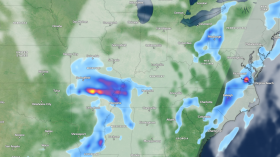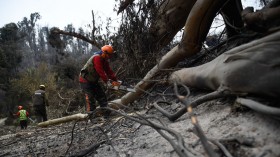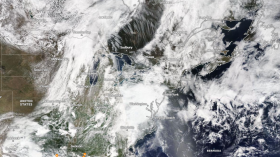A rare but unfortunate event has been happening on the shores of Northern Europe for the past two weeks. There is an unusually high number of stranded whales and sightings of 29 rare beaked whales, and experts have linked it to military sonar exercise.
Series of Unusually High Incidences of Stranded Whales
The unfortunate event started two weeks ago when two northern bottlenosed whales were sighted in the shallow waters of the North Sea. After this, reports from the west coast of Ireland indicate that seven bottlenosed whales were stranded. Six of the whales died, while one was safely returned to the ocean.
In the Faroe Islands, 11 animals were stranded while five were killed.
Two bottlenosed whales were seen in Oosterschelde estuary in the south of the Netherlands. On Saturday, Firth of Clyde, close to Greenock, was where three beaked whales were reported.
In the last ten days, three Sowerby's beaked whales got stranded and died in three different places: the Netherlands, Wenduine in Belgium, and Lowestoft.
A Sowersby's was also found stranded in Portsmouth, Hampshire, but has died soon after.
Initial investigation of the Lowestoft animal did not indicate any signs of narcosis, according to the Cetacean Strandings Investigation Programme of the Zoological Society of London, who are monitoring and examining strandings.
READ: A Closer Look at the Incredible Punch Capacity of the Mantis Shrimp
The Reason for the Bizarre Event
Scientists have several explanations of why these things happen.
In 2016, unusual solar storms were blamed for the 30 stranded sperm whales on the North Sea coasts. Scientists believe that the storm may have disrupted the sense of direction of the whales.
But several scientific studies indicate that seismic surveys and military sonar for oil may also be the culprit.
Whales are deep-sea animals feed and thrive on the depth of the ocean, and its appearance is shallow coastal water is a rare event and is often fatal.
READ ALSO: Giant Panda Gives Birth at Smithsonian National Museum
On the other hand, beaked whales hold the record for the longest and deepest dive among the whales. Previous studies indicate that disruptive signal triggers from naval sonars trigger specific behavior in whales leading to its death. Certain frequencies disorient and terrify the whales that make their heartbeat rapidly, which runs counter to deep-sea diving adaptation: slower heart rate. Faster heartbeat leads to decompression sick, an intense pain that hinders the whales. The whales then strand on the beach and eventually die.
It is believed that the military exercises using anti-submarine and mid-frequency active sonar are to be blamed for the death of stranded beaked whales in February this year. Sonar may have scared the whales, prompting it to surface quickly, leading to narcosis.
Earlier this summer, Dynamic Mongoose, a Nato anti-submarine exercise, was on a mission in the coasts of Iceland. The operation ended in July, but conservationists now link that the mass strandings in the past two weeks may have something to do with it.
In a blog post by the Dutch whale researcher Jeroen Hoekendijk, he wrote that the strandings are a direct consequence of military sonar use. He further believes that the recent strandings may be the tip of the iceberg. Jeroen Hoekendijk has been monitoring the stranded whales in the Netherlands.
READ NEXT: New Study Shows Sea Level Rise Will Devastate Cities in California
Check out for more news and information on Whales on Nature World News.
© 2024 NatureWorldNews.com All rights reserved. Do not reproduce without permission.




![Wildfire Activity in Wet African Tropical Forests Exacerbated by Deforestation, Climate Change [Study]](https://1471793142.rsc.cdn77.org/data/thumbs/full/70409/280/157/50/40/wildfire-activity-in-wet-african-tropical-forests-exacerbated-by-deforestation-climate-change-study.jpg)
